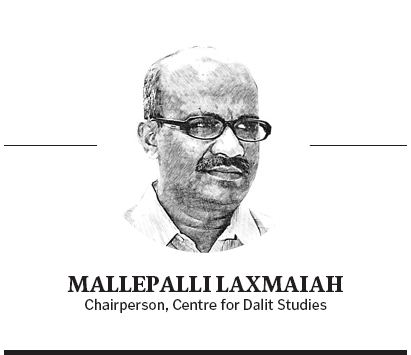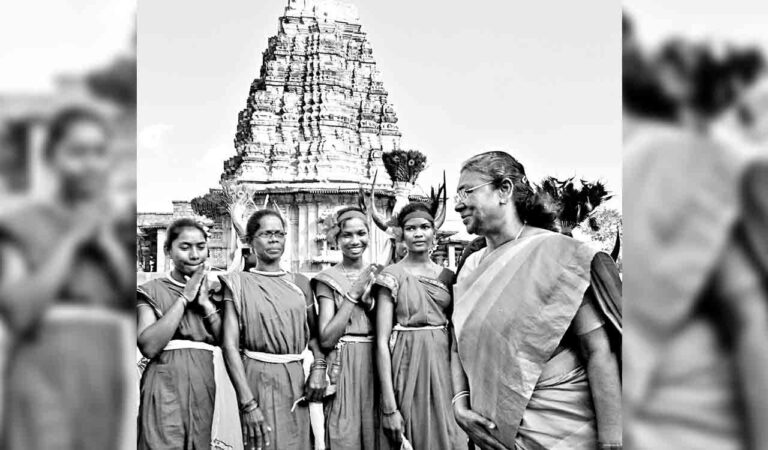President Murmu can take advantage of section 339 and 340 and also schedule 5 to take initiative for ST’s welfare
Release Date – 12:30 AM, Fri – 12 December 30 22

go through Malepali Laxmaia
“This is the most important of all the articles of the Constitution. It’s like the heart of the Constitution. As far as the depressed class is concerned, we are limited to reservations. This article is about the other. It provides a solution to all the problems faced by the depressed class. space. This must be prepared in such a way that it gives the President of the Republic operational powers that enable him/her to implement it successfully.”
These were the comments made by Pandit Thakur Das Bhargava at the Constituent Assembly when Babasaheb Ambedkar introduced the draft articles on June 16, 1948. Article 301 in the draft constitution became article 340 in its final form.
Article 340 provides that the President of the Republic may appoint a commission to study the social and educational situation of SC, ST, BC and other backward classes. The committee has the power to study other aspects of these communities and make appropriate recommendations. Many former presidents did not take advantage of this provision. The only exception is Dr. KR Narayanan. Credit goes to him for using constitutional provisions to study welfare programs for the backward classes.
Governor’s Council
At the Governors’ Conference on 12-13 July 2000, Narayanan announced his decision to appoint a committee of seven Governors to study budget allocations, expenditures and transfers in the context of SC and ST welfare. He also checked the implementation of SC, ST Atrocities (Prevention) Act.
PC Alexander, then Governor of Maharashtra, chaired the committee, while MM Jacob, Governor of Meghalaya, Sukhdev Singh Kang, Governor of Kerala, VS Rama Devi of Karnataka, Himachal Suraj Bhan of State, MM Rajendran of Odisha and Babu Parmanand Haryana of India are members. The commission appointed on 8 August 2000 submitted its report to the President on 28 April 2001. In addition to looking at the social and educational issues facing SC and ST, the committee also reviewed the budget allocation for their benefits and the SC, ST Atrocities (Prevention) Act being implemented. Land distribution, education, housing, public health, career and business promotion programs are also studied.
The commission made several recommendations for development in the northeastern states. This is an extraordinary thing that happened for the first time after independence. Governors have visited all states and met with relevant ministers, civil servants and representatives of the public. However, the NDA government under the BJP has not acted on the committee’s recommendations.
But the committee’s efforts were not in vain. This becomes a powerful weapon in the hands of organizations working for the welfare of SC and ST. Many state governments are taking these recommendations seriously. The report was a major highlight and source of inspiration for the SC, ST sub-plan bill campaign launched in 2001 in Andhra Pradesh.
The NDA government came into office in 1999, with a constitutional review by a committee. President Narayanan was outraged by the committee’s scrutiny. Not only did he express his displeasure, but he set aside the government-prepared speech and spoke from his own notes. He is critically critical of constitutional scrutiny.
welfare measures
There is now context to refer to these issues. Six months ago, Droupadi Murmu took over as President of the Republic of India. She was in Hyderabad for the first time as part of her stay in South India. The general perception of the president is a rubber stamp. But this impression is not entirely correct. A president may not be able to do something against the will of an elected government. But she/he can take advantage of Sections 339 and 340 of the Constitution, and can also resort to Schedule 5, which gives the President powers and authority to take steps to preserve the welfare of ST. President Narayanan has exercised his powers under Article 340.
I mention all this in the hope that President Murmu, who hails from the Santhal community, one of the largest tribes in India, will emulate Narayanan’s wisdom and initiative. A Constitutional Council under Article 339, paragraph 1, already exists. Paragraph 2 of the same article gives the President the authority to enact and review welfare measures against ST. An important aspect of the provision is that the president can examine how welfare programs are being implemented and give guidance.
Schedule V contains ST’s rights designed to protect them. Let’s examine Item 3 of Part A of Schedule 5. The area where the ST resides must be identified and notified as a Designated Area. Provides that whenever the President requests any information on the implementation of STs’ benefit programs, the Governor shall provide such reports. It could be an annual report, or any time the president wants to know. This means that the President can review any activity designed to benefit ST. S/he can provide suitable advice.
Tribal Advisory Council
Likewise, the Tribal Advisory Council (TAC) under Item Four of Schedule Five(B) confers broad powers. Any development, project or legislation intended to benefit ST must be approved by TAC. The Constitution sets out some guidelines for the composition of the TAC. The number of TAC members shall be one-fourth of that of the ST members of the General Assembly, and shall not exceed 20 members.
The TAC is expected to oversee the implementation of all laws applicable to STs and protect their constitutional rights throughout the state. The tragedy, however, is that most state TACs are for the namesake. Many state governments do not recognize TAC. The poor social and economic conditions in the country and the companies developing projects and mines in tribal areas make it clear that the TAC was not consulted.
In this context, the role of President Murmu has become crucial. Indigenous and progressives hope that some light will shine in their lives if the President, who is the Daughter of the Forest and the quintessence of Indigenous women, can exercise all the powers enshrined in the Constitution for their welfare.
Constitutional powers do not apply to personal status. They will be considered representatives of their department. Indigenous peoples have been left behind due to rising social and economic inequality. The fact that rooted women like Murmu were raised to exalted positions would make sense if a powerful council looked at the current state of Adivasis and addressed their contemporary issues. Rightly giving representation to the oppressed classes would be truly justified. Otherwise, Murmu’s name will remain on the list of former Indian presidents like all others.

